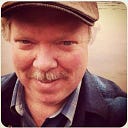Chasing the Dopamine Dragon
People used to say, “pace yourself,” because setting a good and steady pace leads to endurance and the preservation of one’s sanity. That was then. Today, the pace at which we consume information is far too fast, and much too intense. For those of us who are hyperactive in social media platforms or daily bloggers, the pace is relentless. Tweets blaze by like angry drivers on meth. Facebook arguments are wind gusts for the digital inferno. Look to LinkedIn where someone other than you got promoted. Open Instagram and it’s more ‘your-vacation-was-better-than-mine’ photos.
For the past number of years, I’ve savored the brief moments when I’ve been offline. It’s only been a week here or a long weekend there, but these respites always produce the same sensations and lead me to the same conclusions. Offline, I can calm down. My mind stops jumping and I can break free from the obsessive need-to-overshare habit that makes every picturesque scene I happen upon an Insta moment instead of my moment to be here now. After a few days offline, I regain my ability to concentrate. I begin to think and act like a human again, and I return to the person I once was — a person able to read long-form articles and books. A person who has time to listen to others, and be present for my friends and family.
What’s so great about the Internet anyway, and what exactly are Internet addicts seeking? Validation? Friendship? An audience? I’ve found all of the above online. What else do we seek from our mastery of the small screen? Attention. Money. Respect. These rewards are also given, and to some in ample servings. Meanwhile, the great majority receive sporadic injections of these eternally hoped-for items. In other words, the majority of seekers find digital gold dust on occasion, and the exceptionally lucky and hard-working among us find a gold nugget or two. The return on investment is simply not there, but the excitement of gold dust and the longing for gold nuggets remain.
In my pursuit of digital riches, I dove headfirst into the do-it-yourself deep end. In 1999, I taught myself to write HTML and began hard coding my own websites in order to share my writing with a broader audience. By 2004, the need to hard code sites gave way to the blogging platforms. This was the turning point and for me, the great acceleration. I started Adpulp.com to court the Marcom audience, and a handful of other niche sites about bands, sports, and food and beverage. The writer in me started giving way to the marketer in me.
Over the years, my digital habits have become obsessive. Adpulp.com contains more than 10,000 articles. Maybe 400 of them are good articles. On social sites like Instagram or Twitter, it’s hard to assess the hours invested because these apps are just on. But let’s say I spend three to six hours a day on social and blogging, a figure that encompasses both consumption of and production of content. I’m not great at math but I think we can all see just how much has been given to the machine.
Why have I been unwilling to see my addiction to blogging and social media as true threats? Are they not the dark clouds of the silicon sky that I willingly choose to inhabit and cling to? Like any addict, it’s natural to assess what damage my Internet addiction has done to me or those around me. I could argue that it’s stymied my career. I will argue that it’s prevented me from focusing on writing books. I can only imagine and will never know what I might have written at this point in my life, had I never joined Twitter and never started Adpulp.com. I’ve opted for the distractions of online content creation and consumption. Sure, it’s all part of my work too and that’s exactly how I’ve framed it and excused it.
A number of years ago when I became an agency content director, I started referring to myself as a ‘content machine’. It was clever, but not smart. It wasn’t smart because people are not cyborgs and our value is not measured solely by our ability to produce. We may get paid more for this heightened ability but it won’t make us better or more successful people. To do that, we need what we’ve always needed — wide-open eyes, ears, hearts, and minds.
When I look up from the screen, I start to feel normal again and within a few days, I go back to seeing others as neighbors and friends. I can more easily say no to the judgment and hate that infect screens of every shape and size. I can reject the programming and free my mind. I can breathe deep and give thanks for the wealth of things that are right in front of me. The things that truly matter. At the same time, I rely on the screen’s ability to connect me to you. This message is conveyed on a screen. Internet addiction is like food addiction. A food addict has to continue to eat. The path forward is about seeking balance and making healthy decisions. Twitter, for me, is an unhealthy decision. Daily production on Adpulp.com too. The end.
